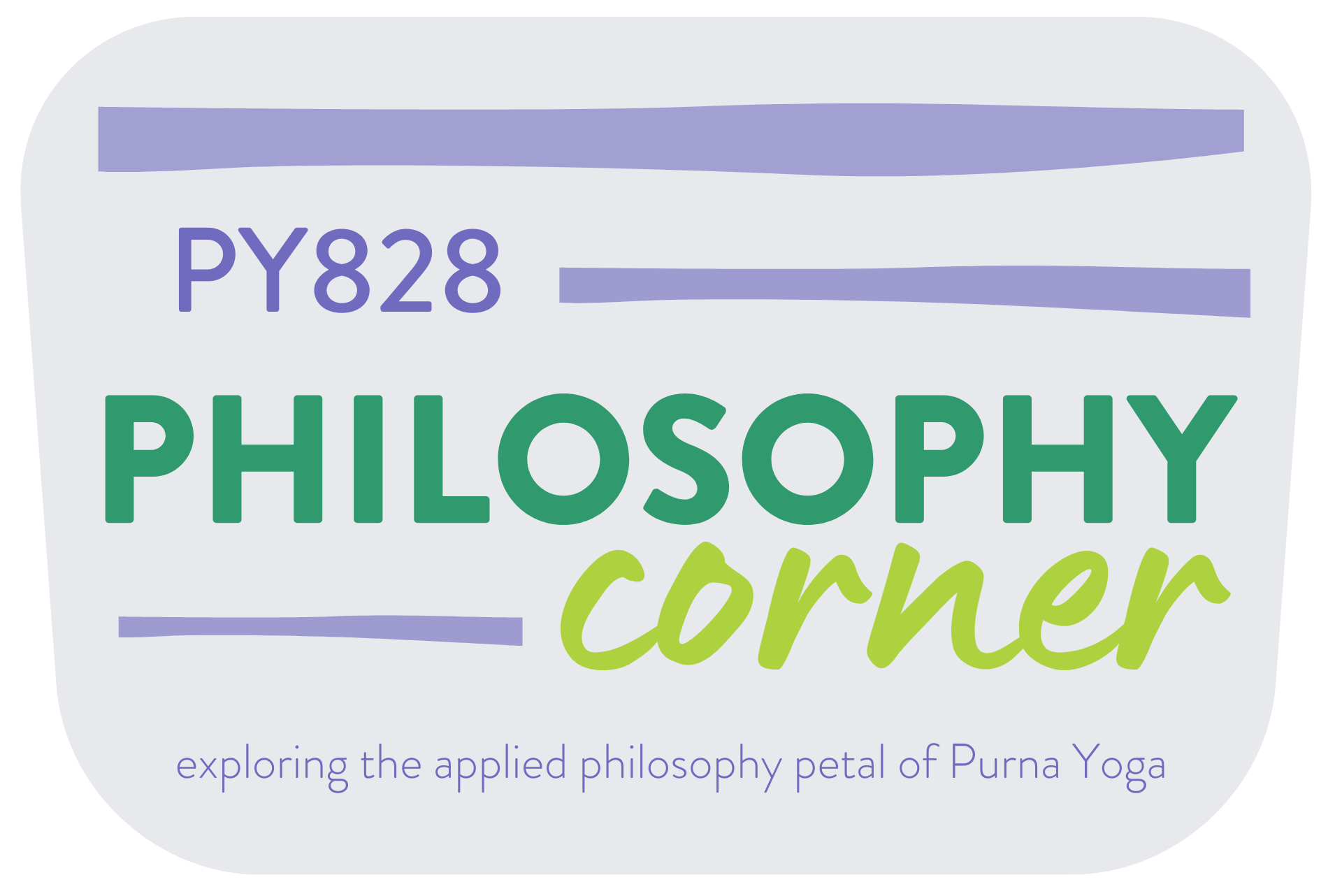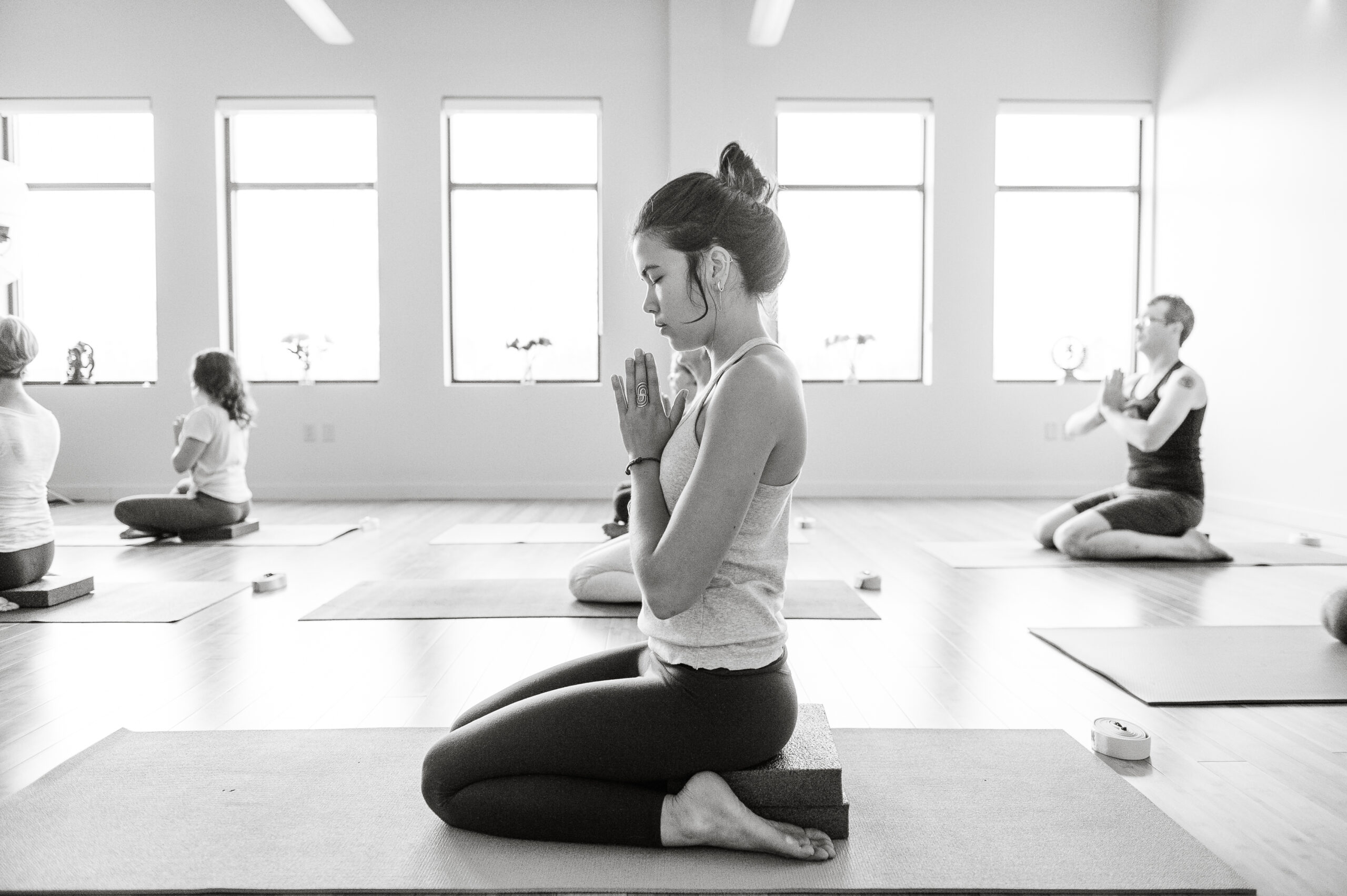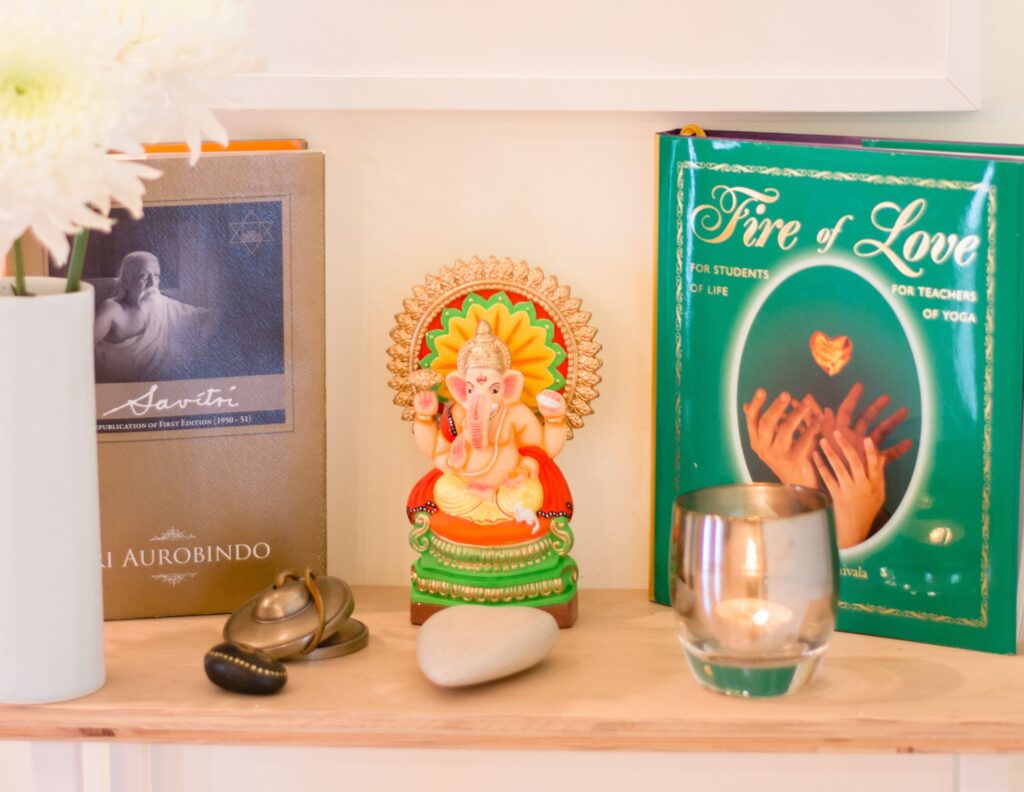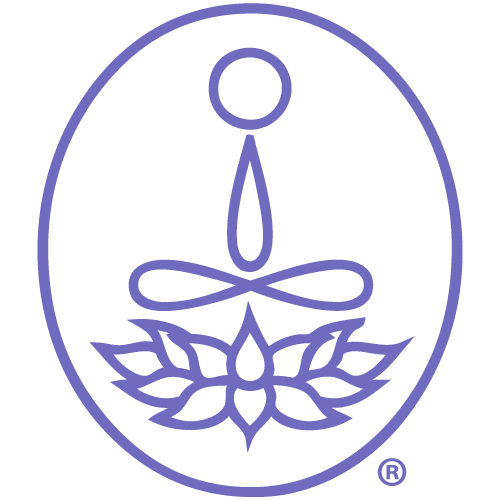
2025 PY828 Monthly Topics July–December 2024
Throughout 2024, we explored a different monthly topic in class and on social media. Each of these topics offer myriad ways to examine and deepen your practice and serve as an entry into the foundational texts of Purna Yoga. Click here for a recap of our posts from the first half of 2024, and scroll on to see the topics from July–December:
July: Becoming more internally referential
This month, we are exploring ways to become more internally referential, a practice Aadil discusses many times in his book, Fire of Love.
“Yoga is about self-discovery, about learning who we are,” Aadil writes, “…everything you have looked for outside is already inside.”
“There are no prescribed practices in Sri Aurobindo’s yoga other than the inward turn, the perpetual looking inside, the intensity of concentration in everything we think, do, and say. There are no rituals in his yoga, just stilling the mind, discovering the heart, transforming the vital nature, making our lives an expression of our souls, and progressing, growing, and evolving each day.”
“Going within ourselves—involution—is always the first step in yoga, exploring the hidden chambers of our heart to find our true Self… Hidden deep within the veiled recesses of the Heart Center is a smile that emerges from a sense of connectedness with all things… As the dreary burdens of life weigh us down, our communication with our heart is stifled, the inner smile is smothered.”
Try this technique Aadil describes to turn inward and (re)connect with that inner smile:
“Stand in Namaskarasana (standing erect with the hands in Namaste). Pause, draw your mind inside your chest, and feel the connection with your Heart Center. Allow your inner smile to emerge and create a smile upon your face. In other words, your face shouldn’t smile because you are expected to smile, but because your face spontaneously reflects the smile in your heart. Once you have found this communication between heart and face, maintain this connection as you perform just one Surya Namaskar or some other familiar pose. Do not move unless your movement is initiated by the inner smile. As soon as the smile is lost, stop, reconnect, smile again, and only then continue. If you are honest, you may be surprised at how little you move. Most of our movements come from habits, conditioning, expectations, or a sense of duty. The mental processes live far from the Heart Center and can hardly be used to bring us back to it. We must be guided by the heart, and its eternal smile.”
August: Integrity
Aadil devotes an entire chapter of his book, Fire of Love, to this topic. Some of his words:
“Integrity comes from the same word as integer, meaning ‘to be one, to be whole.’ When we believe, think, speak, and act in accordance with the truth of the moment, we are one. To feel whole is the essence of fulfillment…
“[W]hen our words and actions are in discord with our thoughts and beliefs, an inner, subconscious stress develops, a pain in our conscience, a disturbing tremor in our soul. When we think one thing yet say another because it is convenient, appropriate, customary, or simply because we don’t want to upset anyone, a subtle tension creeps into our being. Over time, tension piles upon tension, and living feels like one giant burden. Our once buoyant heart sinks and our inner smile withers…
“Our subtle mind is ever watchful, so when we act without integrity, we know it, whether consciously or not. Self-deception is what destroys us… integrity, therefore, is not about other people—it is about what lies within us. Integrity is when I do what I know to be right, even if no one else will ever find out.
“There is no essential difference between the small actions in our lives and the large ones. After all, our life mission can be steered only by our moment-to-moment decisions in every action we make. Whether we are sitting up erect or slouching, whether we are focused on the meaning of this sentence or just reading the words, whether we are giving a hug to someone now or postponing it until tomorrow, we are choosing to nourish or starve our character, to fulfill or forsake our fate. Our perpetual challenge is to ensure that our beliefs and our thoughts—what we really feel deep inside—are in accordance with our words and our actions. Even though acting with integrity may initially cause some discomfort (all change is hard) and discord with others (not everyone is comfortable with integrity!), eventually the body will relax, the brain will find peace, and wholeness will pervade our being.”

September: Navigating change
Yoga is both a lens through which we can examine our own relationship with change and a practice for becoming more comfortable with change.
Why are most of us so resistant to change, even when it’s change for the better? Yogic texts describe obstacles all humans face; the first is avidya. Often translated as ignorance, avidya encompasses all the different ways we fundamentally misunderstand the true nature of reality. We mistake the impermanent for permanent. We mistake little-s self for big-S Self. We paint a picture for ourselves of the world and us in it, and we mistake that picture for true reality.
As Chip Hartranft describes in the introduction to his translation of Patanjali’s Sutra, “we have all developed seemingly tried-and-true patterns of thinking and reacting, crystallizing into stories about ourselves and the world, and we cling to them as our identity and home.” These stories arise out of and are continually molded by the neverending stream of our existence, all our experiences large and small. What seems like a fixed and unchanging “self” is actually an ever-evolving persona—though it feels solid and permanent to us.
Shedding the illusion of that story can feel like losing ourselves—like the very fundamental nature of what is “real” has changed—and that can spark avoidance and fear. Our yoga practice gives us tools for navigating the inevitable internal resistance we feel, not by fighting or overpowering it, but by learning to be adaptable.
Aadil writes in Fire of Love, “When we are growing and learning, truth is constantly changing… Without flexibility of mind, we inevitably fixate on one level of truth, thereby precluding further growth and refinement… To recognize and even expect that truths constantly evolve will not only promote flexibility of mind but also teach us acceptance and patience. We realize that anything we do can be refined without end, and we learn to accept that what is true for today is all we need to work on today. Tomorrow will be time to embrace a new level of truth.”
October: Listening
(This was our first Philosophy Corner post after Hurricane Helene decimated Western North Carolina.)
Our monthly topic for October is listening. We’d planned to dig into aspects of this topic such as listening to learn, listening to compassionate messages within, listening for discernment, listening as an act of humility—there was plenty to explore.
That was the plan.
We all know what happened to October plans in Asheville.
As our monthly topic, this post should have been shared weeks ago. But in honesty, it’s been difficult to sit down and put together even these few thoughts. It’s hard to summon the energy and focus, and it’s hard to spend time on the abstract when the practical day-to-day has been pushed so glaringly to the forefront.
And yet… our yogic philosophy is precisely the thing for us to lean into in the midst of *all of this*.
LISTENING turns out to be a pretty perfect October subject after all, and we’re feeling led to ground our consideration of this topic in the tangible and immediate circumstances of the moment.
We are listening to our neighbors as they express their grief and gratitude and fatigue. We’re listening as they share their needs for recovery, their hopes for what’s next for this place we all call home.
We are listening to the more joyful pockets of social media, where countless stories of mutual aid and community care help keep us energized to continue the work of rebuilding, and remind us to take care of ourselves.
Sometimes we are listening just by sitting with each other, or by attuning ourselves to what is around us. In the words of The Mother, “Listen with your whole being, not just with your ears. Be open to the silence between the words, for that is where the true message lies.”
We are finding comfort in listening. Every culture on earth has music, and sometimes it bolsters and nurtures us like nothing else can. These lines from an @ordinaryelephant song have been in heavy rotation on our mental jukebox lately: “Sometimes our world falls apart / But I guess that’s what it takes / To find the part that cannot break.”
How about you? What good news have you been listening to? What voices soothe your spirit? What songs are bringing you comfort these days?

November: Truth
Our topic for the month of November is truth. In Aadil’s words:
“To grasp the truths of yoga as well as life itself, we must strive to develop both flexibility of mind and strength of mind. Flexibility of mind allows us to realize that truth, at any moment, is a multifaceted diamond, and that the same truth may be simultaneously both right and wrong… Strength of mind is the ability to hold our course when wayward winds blow us away from dharma, and to never give up what we know in our hearts to be true… Every moment, the Divine voice speaks to us in our heart. This inner wisdom, though gentle and loving, yearns to be heard. Only a mind that is flexible can surrender dogma and doctrine long enough to hear the whispers of the inner voice. Only a mind that is strong will act on the message…
“When we are growing and learning, truth is constantly changing as our latent potentials unfold. What was true yesterday is no longer true today… To recognize and even expect that truths constantly evolve will not only promote flexibility of mind but also teach us acceptance and patiences. We realize that anything we do can be refined without end…
“Though the mind bears and manifests the truth, truth is born in the heart. The mind must be still so the heart can be heard. We cannot evolve into a higher level of truth by means of analysis or reason alone. We can evolve only by discovering and living the truth revealed in each moment. Trust is available only in the now. Ideally, the spirit tells us what to do, rather than external circumstances or thoughts. Then we embody the truth of the moment. You will find the practice of quiet meditation on the breath very helpful in turning off the gush of thoughts and entering the present moment. With the mind fully focused on the breath, allow your breath to lead you into the Heart Center and the Divinity it holds…
“Whenever we find a truth and make a conclusion, we must keep in mind that at some point, this conclusion is no longer going to be true. Indeed, if we are evolving, it must become untrue… there is no static truth, only the constancy of growth and refinement.”
December: Self-care
This month we’re contemplating the radical roots of self-care, and how so much of what is today sold as self-care is actual its far less helpful cousin, self-soothing. While self-care is often presented as an individual undertaking (and usually a consumer act!), community activists have long stressed the intersectionality of self-care and civil rights.
In her 1988 book, A Burst of Light, written during cancer treatment, Audre Lorde observed, “I had to examine, in my dreams as well as in my immune-function tests, the devastating effects of overextension. Overextending myself is not stretching myself. I had to accept how difficult it is to monitor the difference. Necessary for me as cutting down on sugar. Crucial. Physically. Psychically. Caring for myself is not self-indulgence, it is self-preservation, and that is an act of political warfare.”
As a community of practice, we have always emphasized the path of yoga as radical self-love that expands into actions of love in our community—the one is supposed to coincide with the other, by design. And conversely, we can’t show up for our community as the fullest versions of ourselves when we are depleted, stressed out, stretched thin, or just plain exhausted.
Dr. Saundra Dalton-Smith described seven different types of rest that our bodies and minds need to function properly:
Physical rest is using your body in a way that feels restorative. It might look like taking a nap, setting a timer for regular stretch breaks throughout the day, or getting a massage.
Mental rest helps us unplug from a state of constant engagement and decision fatigue. It might mean following a meal plan this week so you don’t have to think each day about what’s for dinner or logging off social media for the weekend.
Emotional rest creates space for us to authentically express feelings and release the urge to please everyone around us. It could be delegating caregiving responsibilities, or saying no to an event or project that will be especially stressful, or saying yes to a hike with a close friend.
Sensory rest lets us turn down the intensity of our overly stimulating world and gives all our senses a break. Try an eye mask for sleeping. Turn off the podcast and enjoy a meal in silence. Soak in a warm bath in a quiet room. Do your grocery shopping when the store is less crowded. Switch to unscented personal care products.
Creative rest gives us respite from the need to constantly be productive. Press ‘pause’ on the urge to be always creating and producing for others, and do something just for the joy of doing it.
Social rest. Some relationships or interactions feel energizing and supportive. Others feel depleting and toxic. Social rest is embracing the former and letting go of the latter.
Spiritual rest nourishes us by reconnecting us with the divine in all things. It might include things like affirmations, meditation, letting ourselves feel awe at the beauty of the world around us, or fellowship with people with a similar faith or spiritual tradition.



Sorry, the comment form is closed at this time.